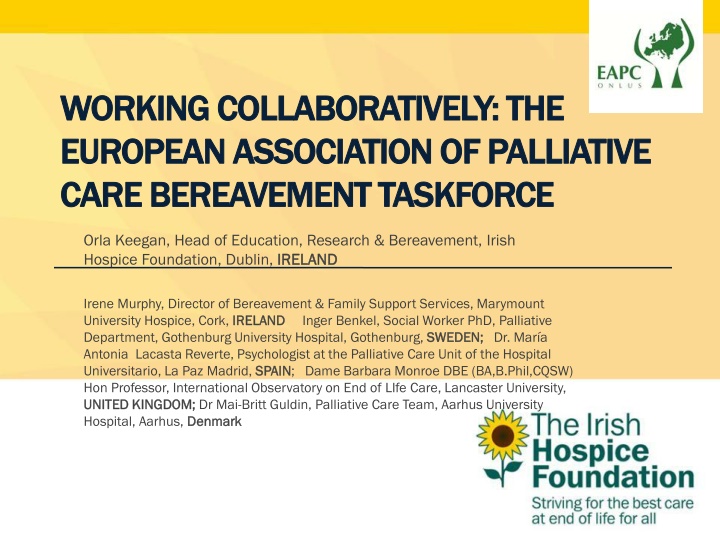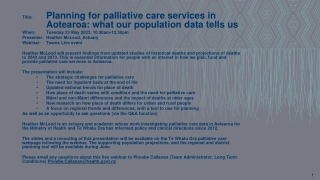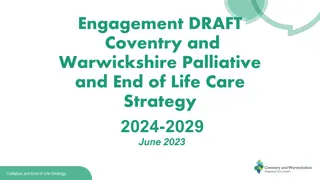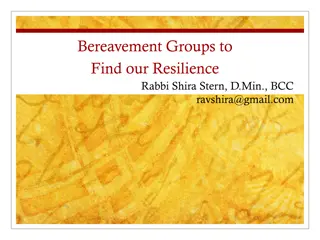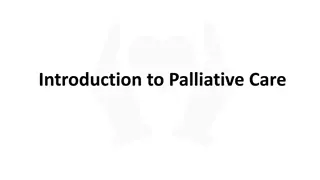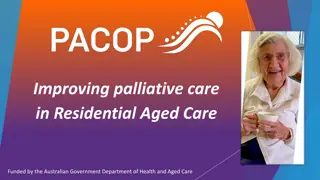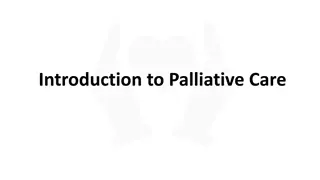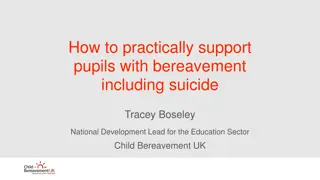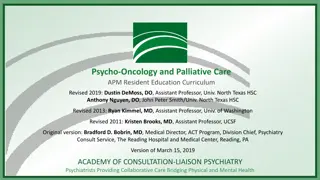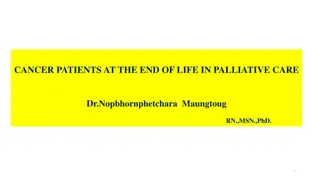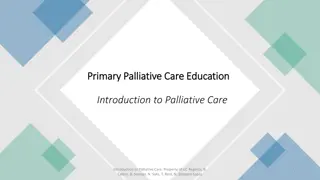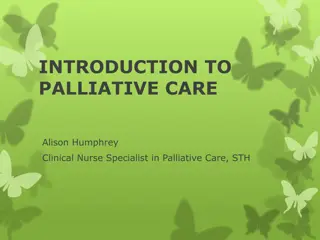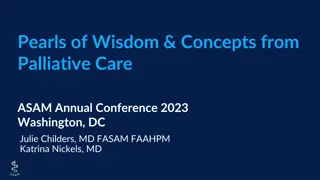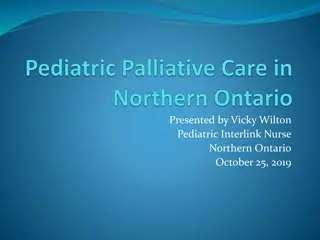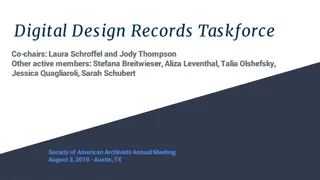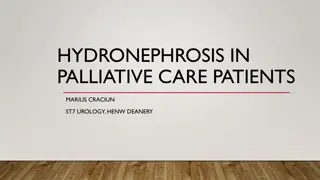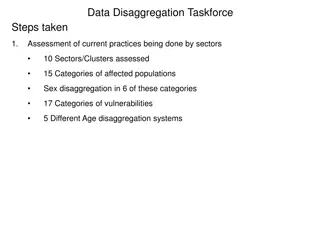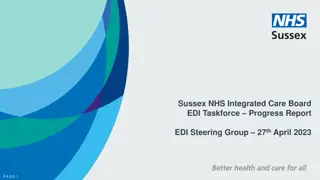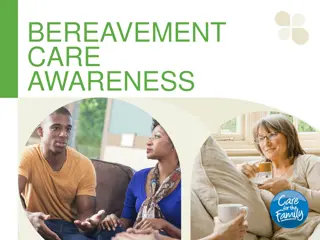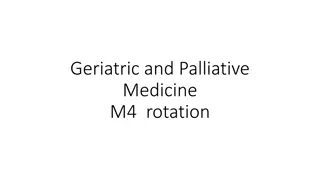Collaboration in Palliative Care Bereavement Taskforce Across Europe
European Association of Palliative Care Bereavement Taskforce was established through strategic conversations to address gaps in knowledge. The taskforce, comprising members from Ireland, Denmark, Spain, Sweden, and the United Kingdom, worked collaboratively through meetings and teleconferences to improve palliative care services, emphasizing the importance of addressing bereavement. The initiative aimed to enhance the quality of life for patients and families facing life-threatening illnesses by providing holistic support from diagnosis to end-of-life and beyond.
Download Presentation

Please find below an Image/Link to download the presentation.
The content on the website is provided AS IS for your information and personal use only. It may not be sold, licensed, or shared on other websites without obtaining consent from the author.If you encounter any issues during the download, it is possible that the publisher has removed the file from their server.
You are allowed to download the files provided on this website for personal or commercial use, subject to the condition that they are used lawfully. All files are the property of their respective owners.
The content on the website is provided AS IS for your information and personal use only. It may not be sold, licensed, or shared on other websites without obtaining consent from the author.
E N D
Presentation Transcript
WORKING COLLABORATIVELY: THE WORKING COLLABORATIVELY: THE EUROPEAN ASSOCIATION OF PALLIATIVE EUROPEAN ASSOCIATION OF PALLIATIVE CARE BEREAVEMENT TASKFORCE CARE BEREAVEMENT TASKFORCE Orla Keegan, Head of Education, Research & Bereavement, Irish Hospice Foundation, Dublin, IRELAND IRELAND Irene Murphy, Director of Bereavement & Family Support Services, Marymount University Hospice, Cork, IRELAND IRELAND Inger Benkel, Social Worker PhD, Palliative Department, Gothenburg University Hospital, Gothenburg, SWEDEN; Antonia Lacasta Reverte, Psychologist at the Palliative Care Unit of the Hospital Universitario, La Paz Madrid, SPAIN SPAIN; Dame Barbara Monroe DBE (BA,B.Phil,CQSW) Hon Professor, International Observatory on End of LIfe Care, Lancaster University, UNITED KINGDOM; UNITED KINGDOM; Dr Mai-Britt Guldin, Palliative Care Team, Aarhus University Hospital, Aarhus, Denmark Denmark SWEDEN; Dr. Mar a
Outline Why? How? And what did we do? And so what?
EAPC PROCESS OF SETTING UP A TASKFORCE for bereavement WHY? A conversation Strategic opportunity A gap in knowledge
Taskforce Taskforce Mode of work Mode of work Meetings Meetings Countries Countries Ireland Denmark Spain Sweden United Kingdom Teleconference EAPC Congress, Prague 2013 Email Drop box EAPC Congress, Copenhagen, 2015 Disciplines Psychology x3 Social work x3
PALLIATIVE CARE Palliative care improves the quality of life of patients and families who face life-threatening illness, by providing pain and symptom relief, spiritual and psychosocial support from diagnosis to the end of life and bereavement http://www.who.int/cancer/palliative/en/) bereavement (WHO,
What do we know about actual bereavement service in palliative care? Australia Australia: Mather (2008); Abbott, O Connor and Payne (2008). US US: Demner (2003). UK UK: Field et al, 2004; Reid, Field et al 2006; Field et al 2007. EAPC EAPC Atlas of Palliative Care (2007, 2013). Denmark Denmark (Danish Knowledge Centre for Palliative Care). Spain Spain (SEPCAL).
Issues Single country studies, no European data or model? Published data relates to Australia, UK and US Only one comparison study (O Connor 2009) notes similarities across countries nurse led service, development obstacles connect to lack of fund and personnel; little audit and research. It concludes more guidance is needed on what constitutes an acceptable bereavement service in hospice/palliative care.
Contemporary literature Promoting a public health approach to bereavement care which has big implications for how hospice and palliative care services link with their communities Aoun SM, Breen LJ, Howting DA, Rumbold B, McNamara B, et al. (2015) Who Needs Bereavement Support? A Population Based Survey of Bereavement Risk and Support Need. PLoS ONE 10(3): e0121101. doi:10.1371/journal.pone.0121101 http://127.0.0.1:8081/plosone/article?id=info:doi/10.1371/journal.pone.012 1101 Margaret Sealey1*, Moira O Connor1, Samar M. Aoun2and Lauren J. Breen1 Exploring barriers to assessment of bereavement risk in palliative care: perspectives of key stakeholders http://www.biomedcentral.com/1472- 684X/14/49
Fig 2. The Public Health Model: Predicted (in brackets) and Actual Proportions for the three risk groups. Fig 2. The Public Health Model: Predicted (in brackets) and Actual Proportions for the three risk groups. Aoun SM, Breen LJ, Howting DA, Rumbold B, McNamara B, et al. (2015) Who Needs Bereavement Support? A Population Based Survey of Bereavement Risk and Support Need. PLoS ONE 10(3): e0121101. doi:10.1371/journal.pone.0121101 http://127.0.0.1:8081/plosone/article?id=info:doi/10.1371/journal.pone.0121101
Aims and Objectives Describe current practice in bereavement care in palliative care services in Europe with reference to two models Public health approach Three tiered model of National Institute for Clinical Excellence (NICE, UK) To make statement of recommendations for best practice in bereavement care Achieve European consensus for these recommendations EAPC Bereavement Task Force, Copenhagen, 2015
Methodology 54 item online questionnaire to explore the nature of bereavement care with reference to 3 tier approach Informed by previous surveys in UK, US, Australia Pilot survey to bereavement co-ordinators in different countries Disseminated to 56 National Associations in 32 countries 56 National Associations in 32 countries in Europe Questionnaire available in English & Spanish- Blogs Open ended questions about local and cultural aspects EAPC Bereavement Task Force, Copenhagen, 2015
Results 370 online responses from 25 countries (78%) 302 offered bereavement support (82%) EAPC Bereavement Task Force, Copenhagen, 2015
Results Most offer bereavement services (n=302, 82%) And offer services at each of the three levels used in the public health model....
however Decisions are not governed by assessment tools .... One fifth are never audited and... Guidelines not evident
Results % EAPC Bereavement Task Force, Copenhagen, 2015
Conclusion Rich data gathered looking for partners to develop country information Dissemination Phase 2 EAPC Bereavement Task Force, Copenhagen, 2015
What did we learn from collaborative working Irish and Danes.... Time (long) and cost (cheap!) Life intervenes More the same than different.... Research, policy and practice gap....
